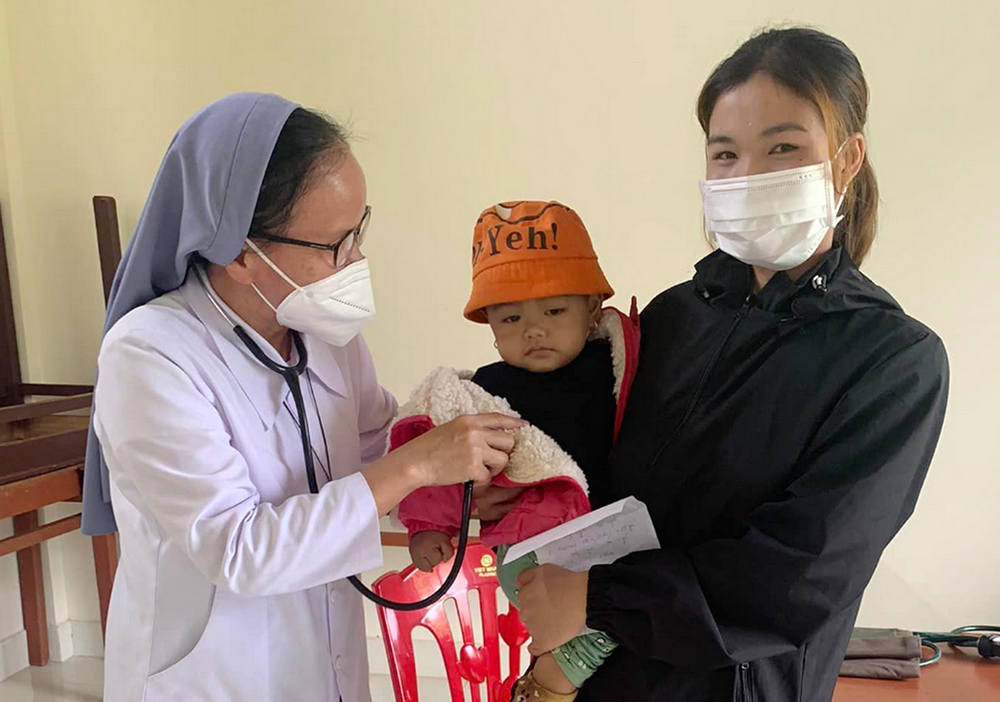
Filles de Marie Immaculée Sr. Rosa Vo Thi Hien examines the baby of Van Kieu ethnic Ho Thi Xoa May 26 in Cam Lo district, Vietnam. (GSR photo/Joachim Pham)
When Van Kieu ethnic Ho Eng suffered from a persistent hacking cough, he neither went to see a doctor nor took medicine.
From the mountains of Quang Tri province, the 50-year-old blacksmith had long exposed himself to coal dust, smoke and fine ash while making and repairing sickles, scythes, knives and other farm implements to support his family.
Ethnic villagers like him work all day on farms and collect vegetables and fruits to put food on the table. They pay no attention to their health problems until they cannot bear the pain; they only use herbal medicines and are not in the habit of seeking medical treatment at public health facilities, relying on shamans instead.
When Eng's health worsened — with chest tightness, breathing problems, and fatigue — he was invited to see a visiting group of nuns and health care givers for the first time at the Tin Mung Mission Station, which belongs to Khe Sanh Parish and serves 34 members.
Eng was diagnosed with chronic bronchitis and given free medicines. He was also told how to look after his health and prevent diseases caused by polluted air.
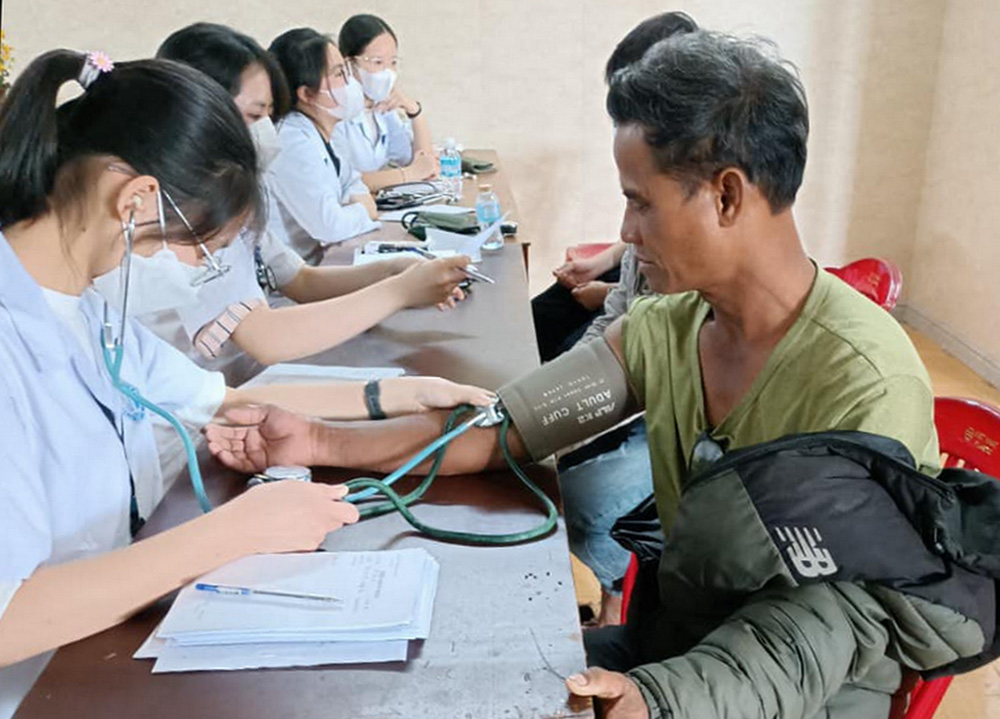
Van Kieu ethnic Ho Eng has a medical checkup April 25 in Quang Tri province’s Huong Hoa district. (GSR photo/Joachim Pham)
"Now my health is improving gradually, and I know how to maintain my physical health by having face masks on and taking short breaks during my work, eating nutritious food, going to bed on time, and seeing a doctor every time I have health problems," he said.
Lovers of the Holy Cross of Hue Sr. Agnes Duong Thi Phu, who is at the helm of her congregation's health care initiative for rural poor people, said they have dispensed free health care to local villagers three times since 2021. While some of the sisters are physicians, others like Phu have studied specific aspects of it, such as surgery.
Locals have no money to seek treatment from public hospitals, as annual floods damage their houses and wash away their crops, poultry, cattle and other belongings. Common diseases include malaria, dengue fever, high blood pressure, headaches, digestive problems, cough, scabies on limbs, and gingivitis.
Phu said her congregation regularly offers emergency aid to flood victims, as many patients cannot afford to buy medicines or seek medical treatment from public hospitals.
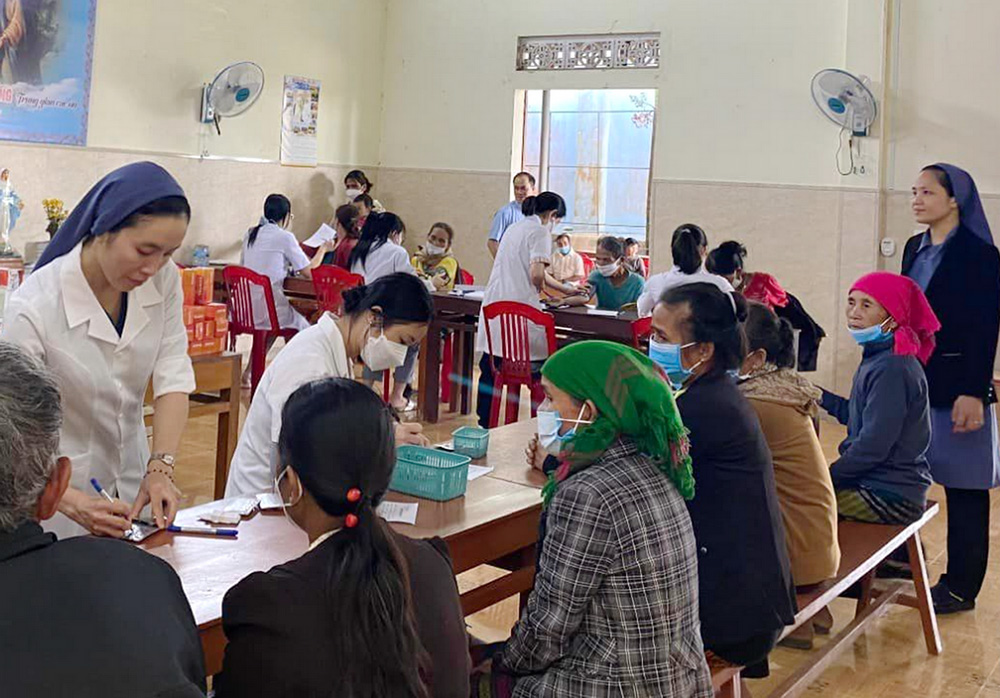
Lovers of the Holy Cross of Hue Sr. Agnes Duong Thi Phu (left) shows ethnic patients how to take medicines in Huong Hoa district. (GSR photo/Joachim Pham)
"We have given free medical checkups and medicines to all people regardless of their background as a way to share God's love with them," she said.
Sisters from local parishes make home visits and offer free medicines to patients with minor illnesses, and they invite Phu's team of health care givers to serve a large number of people.
Their service, however, comes with its own legal challenges, Phu said: They are required to apply for government permits and to send the team members' personal information to authorities for approval before their medical trips.
"It often takes us one week to obtain official permits," she said, adding that in some cases authorities refuse to grant them permits for security reasons and poor facilities.
The 45-year-old nun — who lives in the congregation's motherhouse in Hue — said that for the past two years, they have given free medical treatment to hundreds of poor patients in remote areas in the two provinces of Quang Tri and Thua Thien Hue. During these visits, which happen once or twice a year for a couple days at a time, patients are also offered food, clothes and money to improve their health.
They also take medical equipment to serve poor patients during occasional medical trips, one to three days each time; six nuns and eight doctors and nurses from Hue University of Medicine and Pharmacy arrange the trip.
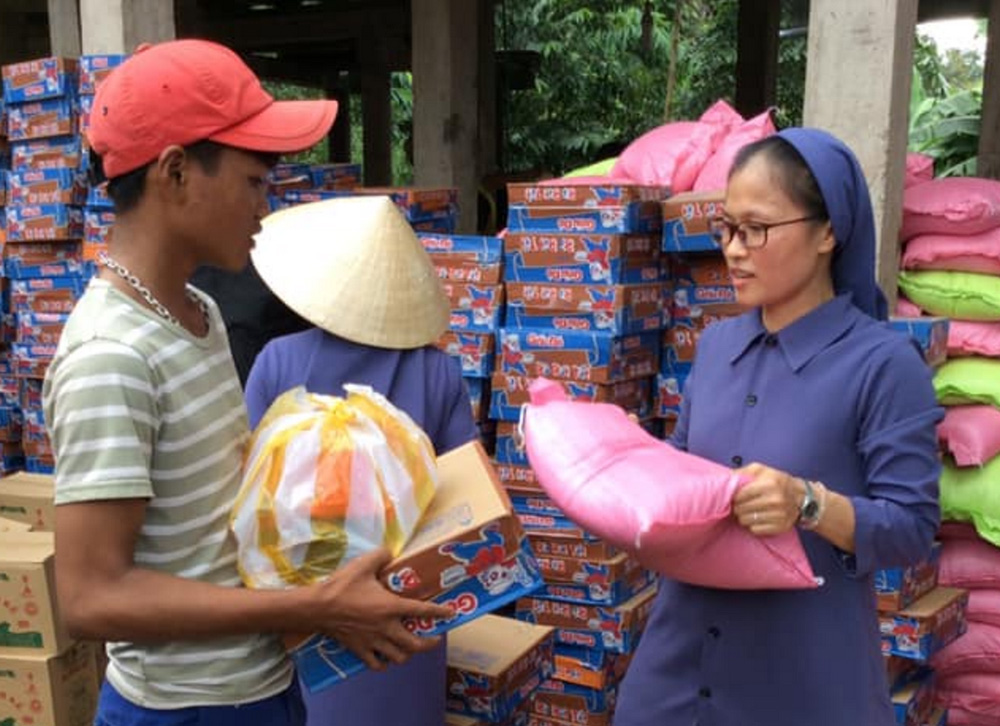
Lovers of the Holy Cross of Hue Sr. Lucia Nguyen Dieu Trinh (right) gives rice, instant noodles, and other food to a patient in Huong Hoa district April 25. (GSR photo/Joachim Pham)
"We invite the doctors and nurses, who are our friends, to join our mission so that we look after more people and serve them better," Phu said, adding that they collect medical supplies from local benefactors for their service.
They gather and serve patients at convents, public dispensaries and schools, and people's houses.
Phu said their medical trips are opportunities for them to provide proper health care for rural poor people and teach them how to protect themselves from common illnesses, learn to distrust shamans, and abandon superstitious practices.
Lovers of the Holy Cross of Hue Sr. Mary Phan Thi Sa, a 37-year-old nurse from Khe Sanh Convent, teaches practical knowledge of how to reduce the risks of infection, tetanus, enteritis, gastritis, bronchitis, tuberculosis, malnutrition among children, gynecological diseases, and HIV/AIDS.
Sa recalled a young man who stepped on old barbed wire from the war while trapping wild chickens in the forest barefoot. He covered the open wound with dirt as he believed that it would be healed, but one week later his foot swelled and became infected. He had to have it cut off at a hospital.
"We're making every effort to educate people to look after their physical health," the nun said. "We are pleased to see many enjoy good health and work hard to support their families."
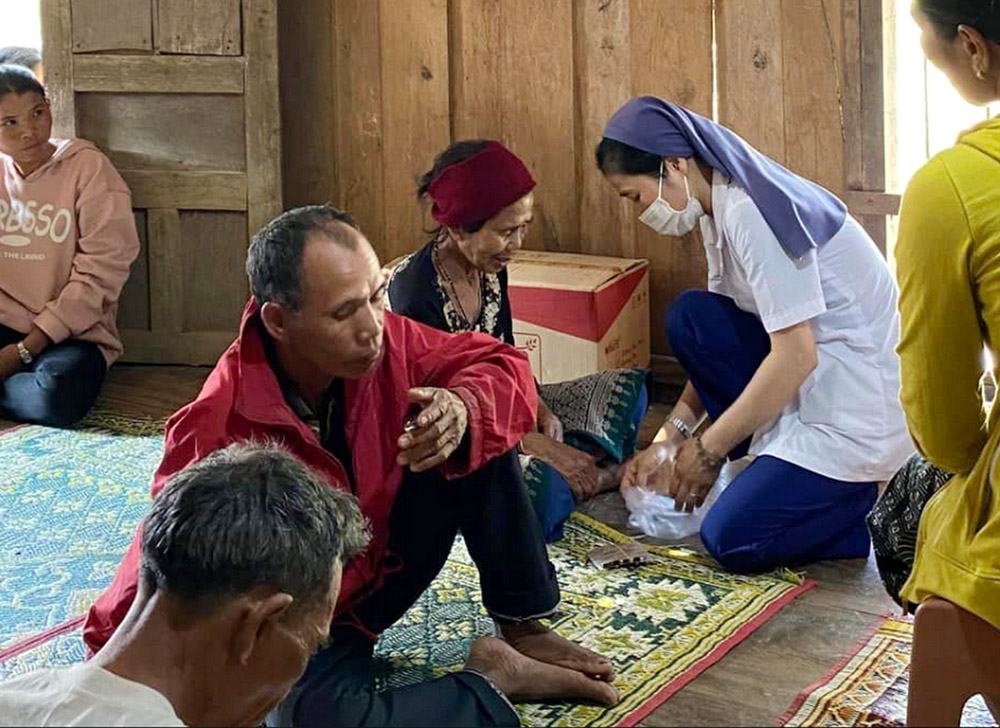
Lovers of the Holy Cross of Hue Sr. Mary Phan Thi Sa gives free health checkups and medicines to a Van Kieu ethnic family in April. (GSR photo/Joachim Pham)
Van Kieu ethnic Ho Tinh, deputy of the Red Cross Association based in Huong Hoa district, said many villagers still trust shamans to cure them of their illnesses that are believed to be caused by ghosts.
Tinh, 54, said few people send their children to schools, and many youths get married at ages of 14-15 and with their close relatives. Consequently, many children suffer from undernourishment, disfigurements and malformations.
Tinh highly appreciates the nuns from Khe Sanh Parish serving local patients with food and health care and improving their material lives by providing them with financial support to raise cattle, repair their shelters after floods, and send their children to schools.
"We're only too glad of their generous support that is a real godsend for us in this remote area," he said.
The desperate need for free health care and education for poor people — including ethnic groups who live in remote areas — prompts multiple congregations to employ similar outreach.
Filles de Marie Immaculée Sr. Mary Do Thi Ha said three sisters and 10 lay volunteers from Kim Long Charity Clinic based in Hue take monthly medical trips to disadvantaged places in the central provinces of Ha Tinh, Quang Tri and Thuan Thien Hue. The clinic run by the congregation serves some 40 patients without charge every day.
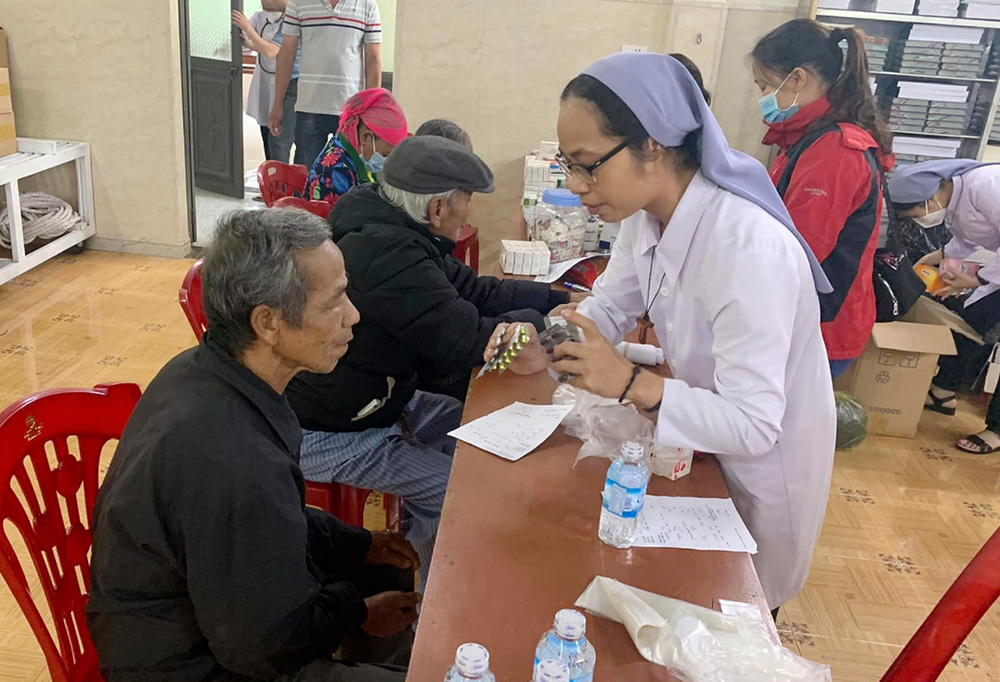
Filles de Marie Immaculée Sr. Mary Do Thi Ha hands out medicine during a medical trip to Dakrong district in January. (GSR photo/Joachim Pham)
Ha, an expert in gastroenterology, said many people do not have enough money to purchase medical insurance for their family members. Others fail to buy prescription medicines that insurance doesn't cover, and many who live far away from health care centers are unable to seek timely public health services. Some youths who work away from homes return home with HIV/AIDS, syphilis, tuberculosis, gonorrhea and hepatitis.
The nuns and volunteers provide them with medicines, ultrasound scans, electrocardiogram and food. Benefactors cover their costs.
Some 100 people receive free medical care from them during each trip.
Dental surgeon Le Thi Trang, who has joined the nuns' medical trips for years, said she spends as much time as possible listening and consoling patients, encouraging them to be patient with their treatment, and giving up improper practices in treatment.
Trang recalled examining a Pa Ko ethnic woman who felt a sharp pain in her teeth. The woman often held baby urine in her mouth as a way to relieve her toothaches.
After finding the patient's gums infected, Trang showed her how to take medicines and encouraged her to stop her urine treatment. The patient fully recovered from her illness 10 days later.
Advertisement
The dentist espouses the nuns' medical mission in rural areas, as many poor patients now have opportunities to access proper health services, are cured of their illnesses, and know how to maintain their health.
Ho Thi Xoa, a Van Kieu ethnic villager from Cam Lo district of Quang Tri province, said she daily collects bamboo shoots and herds a flock of seven goats in forests for a living, all while carrying her 1-year-old baby on her back. Her husband works in a field of cassava.
Xoa, 17, felt pain in her abdomen for weeks but could not go to a local health care center for checkups — until sisters and volunteers visited her village in May.
"I am surprised to hear that ultrasound showed I was 11 weeks pregnant," she said, adding that the doctor told her to get some rest, have nourishing meals, maintain personal hygiene, and especially to see the doctor every time she has any health problems. She and her baby were also given tonics and food.
"I am grateful for all their kindness, support and especially medical care they brought to me," said the teen mother, who does not have insurance.
"We try to bring proper health care to people in need, relieve their spiritual and physical pain, and help them to look after themselves," Ha said. "That is our mission."






